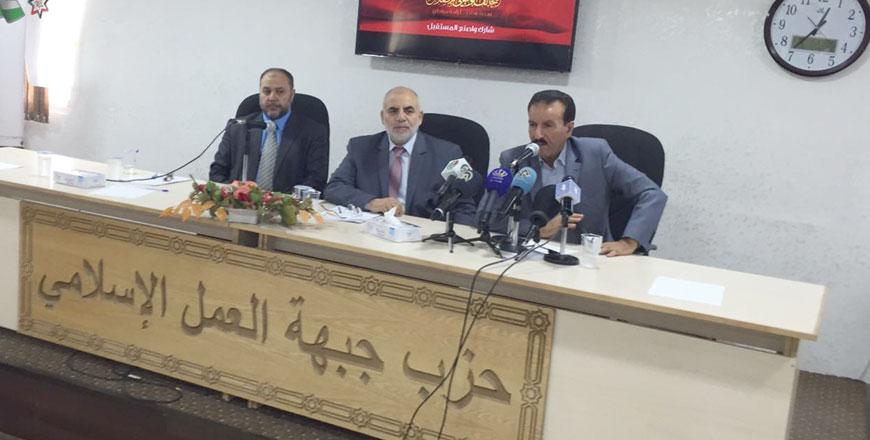You are here
‘Real political reform’ requires involvement of political parties, civil society — lawmakers
By Dana Al Emam - Jan 14,2017 - Last updated at Jan 14,2017
AMMAN — The “weak” representation of political parties and the lack of “strong and consistent” coalitions in the Lower House impede efforts for political reform, lawmakers agreed on Saturday.
Speaking at a conference titled “The 18th Parliament: Performance Challenges and Reform”, organised by Al Quds Centre for Political Studies and the Jordanian Parliament Monitor, MPs said the absence of blocs with firm and united stances weakens Parliament’s general performance.
MP Khaled Bakkar (Irbid, 4th District) said any attempt to achieve political reform that does not engage political parties is “incomplete”.
Yet, he said the limited financial allocations for the Lower House prevent supporting the formation of coalitions and blocs, which offer a partial substitute to the lack of effective political parties working under the Dome.
Meanwhile, Balqa MP Jamal Gammoh criticised authorities’ use of “maintaining the country’s stability and security” as a pretext to hinder political reform, noting that maintaining stability and advancing political reforms do not conflict.
“What we are witnessing nowadays is political beautification, not reform,” he said.
While Gammoh agreed with Bakkar on political parties being one of the pillars of an effective Parliament, he said the recent Elections Law did not differ much from the one-person, one-vote system.
Another factor that contributes to the weakening of Parliament’s performance, according to Gammoh, is the “imprecise and unprofessional” selection of committee members.
Deputy Wafaa Bani Mustafa, who won on women’s quota in Jerash, said the quantity of legislative work at the House is not necessarily indicative of quality.
She added that members of the 17th Parliament accomplished “large” amount of legislative work, including the endorsement of 172 laws and raising 3,092 questions to the government.
One of the passed laws was the Elections Law, which she said did not succeed in its initial purpose of supporting the formation of coalitions, adding that even members of a single parliamentary bloc generally do not have a unified stance and vote differently on the same motion.
The Elections Law discards the one-person, one-vote electoral system and replaces it with a voting system in which candidates run for parliamentary elections on large tickets at the constituency level.
MP Musa Wahsh (Amman, 2nd District) argued that the 18th Parliament has developed a “service discourse” since the very beginning, with “very modest” attempts to practise its legislative and monitoring role.
Parliamentarians also cited a need for a balanced partnership between the legislative and executive bodies, where the legislative arm of the government maintains its freedom to oppose the executive branch.
Bakkar said the executive body’s shortcomings in providing citizens with basic needs forces MPs to take on that “service” role, an issue that negatively hinders their capacity to practise their legislative and monitoring roles.
Bani Mustafa pointed to a “growing gap” between the two powers, where neither works on reforming its own institutions nor adopting a teamwork mindset.
Balqa MP Fawzi Daoud, who was the moderator of the session, said Jordan’s current political environment is largely in need of reform, a process that should actively involve the civil society.
Oraib Rantawi, the head of Al Quds Centre for Political Studies, said the 18th Parliament is convening at a time of “severe and unprecedented” economic hardships
Lawmakers, he added, must address these issues efficiently in order to restore citizens’ faith in Parliament and in public institutions at large.
Another major challenge for lawmakers is growing extremism in society, which is not limited to religious and political issues, according to Rantawi, who highlighted verbal and physical violence as other signs of this problem.
In addition to the need to develop “a genuine political will to improve the role of the Lower House”, Daoud concluded that Parliament, associations, political parties and civil society organisations must work together to effect positive change beyond the scope of the legislature.
Related Articles
Twenty-seven political parties have agreed on the need to draft a new elections law that does not follow the one-person, one-vote formula and gives a greater role to political parties, Oraib Rantawi, director of Al Quds Centre for Political Studies, said on Saturday.
AMMAN — The National Coalition for Reform, which represents the Islamic Action Front (IAF) and its allies, will compete for the Lower House
AMMAN — Minister of State for Media Affairs and Communications Mohammad Momani on Saturday said the 2015 draft elections law is a “leap” on
















